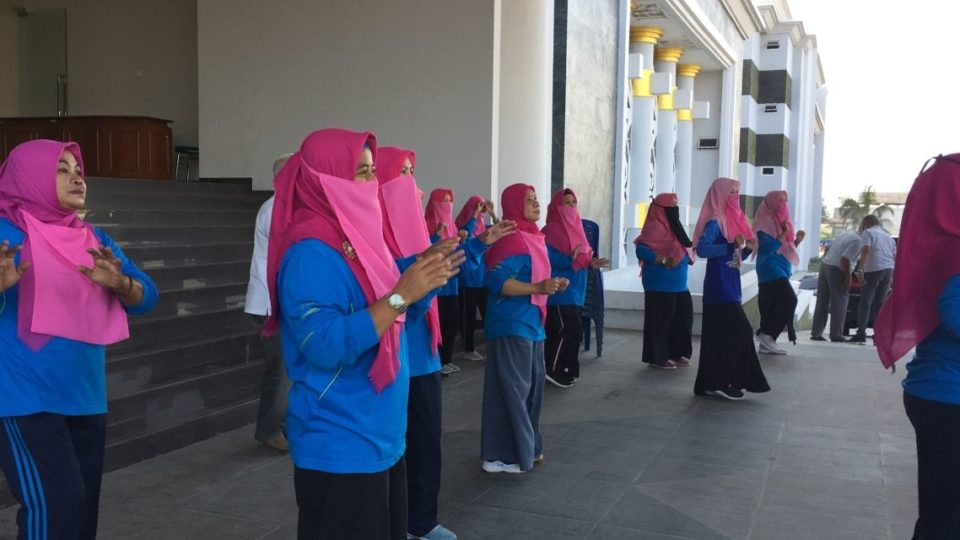A new dress code for female civil servants in Indonesia’s Central Lombok regency should concern all Indonesians.
On June 26 the Central Lombok regent, Moh. Suhaili Fadhil Thohir, instructed all female Muslim civil servants to wear a “cadar” (or “niqab”) Islamic face covering instead of a face mask as part of the battle against the coronavirus pandemic. He also suggested holding a contest for the best niqab.
Related — Lombok regent calls for civil servants to wear ‘fashionable’ niqab in place of mask
Women all over Central Lombok started purchasing niqabs. On July 3, for the first time, dozens of female civil servants participated in their weekly morning assembly wearing niqabs or full-face veils. Thohrir inspected female civil servants, mentioning the units one by one – public service, transportation, education – and their compliance with the niqab requirement. He praised the units that had overwhelmingly complied, while asking others “to do better” when some staff members wore long pants instead of long dresses with their niqabs.
Compelling Muslim women to wear a niqab to work is discriminatory. Male civil servants and non-Muslim women face no such restrictions on their attire and instead are encouraged to wear face masks to protect themselves from the virus that causes COVID-19. There is no medical evidence to suggest that a niqab is as effective a barrier as a face mask to protect one from the coronavirus.
In the Middle East, where a few countries have dress codes, Human Rights Watch is not aware of any that impose the niqab as mandatory face covering during the pandemic. This makes Indonesia an outlier in the dubious practice.

Indonesia’s National Commission on Violence Against Women (Komnas Perempuan) has identified hundreds of discriminatory national and local regulations in Indonesia, made in the name of Sharia (Islamic law), that violate women’s rights. These include forcing women and girls to wear the hijab (or headscarf) in government buildings, schools or public places, curfews, and other restrictions against women and girls.
It began in 2004 in Cianjur, West Java, when a regent ordered female civil servants and school students to wear the hijab. Later that year, the province of Aceh also passed a mandatory hijab regulation. It gradually spread to many other parts of Indonesia. Since 2011, Lombok has had its own mandatory hijab regulation for civil servants.
The new instructions in Central Lombok to female civil servants goes even further. If there is little opposition, the instructions may be a precursor to new local regulations legally requiring all women to wear the niqab. This discriminatory dress code creeps across the archipelago and is strengthened by the central government’s failure to act.
The Central Lombok regent should withdraw his instruction and make it clear that Muslim female civil servants in his regency are not obligated to wear a niqab. Indonesia’s central minister for women’s empowerment, I Gusti Ayu Bintang Darmawati, should also explicitly state that women have the right to choose to wear a niqab or not in line with the right to be free “from discriminatory treatment based upon any grounds whatsoever” under Indonesia’s Constitution.
Wearing a niqab to work should be a genuine choice. Providing preferential treatment to women who abide by this dress code is effectively a sanction against those who don’t. Women are entitled to the same rights as men, including the right to wear what they choose. Human rights law guarantees the right to freely manifest one’s religious beliefs and the right to freedom of expression. Any limitations on these rights must be for a legitimate aim, applied in a non-arbitrary and non-discriminatory manner. For this reason, Human Rights Watch also opposes the move by some European countries to ban full-face veils.
The Jokowi administration’s failure to act now on women’s rights will betray Indonesian women – and all Indonesians.
Elaine Pearson is Australia Director at Human Rights Watch and also supervises the organization’s work on Indonesia. Follow her on twitter @pearsonelaine.




